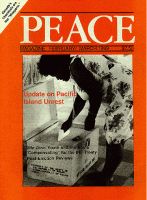
Peace Magazine Feb-Mar 1989, page 30. Some rights reserved.
Search for other articles by Elias Stavrides here
THIS IS A CRUCIAL YEAR in organized labour's renewed call for action against federal government plans to further militarize the Canadian economy, at the expense of civilian manufacturing and social service jobs. The question of peace and jobs is becoming increasingly linked in the minds of many voters. There can be no jobs without peace and no peace without the implementation of conversion policies, which will reflect the spirit of the times for global cuts in the nuclear and conventional arms sectors.
The call is part of organized labour's renewed determination to continue the struggle against free trade, which it now sees as the means through which the federal government will try to justify its regressive schemes. Such fears have their basis in the trade agreement itself, the text of which specifically restricts the traditional role of the Canadian government by designating non-military regional development monies and programs as "unfair subsidies" to trade, while subsidies for arms production are specifically exempted.
This threat, which is more real than most people think, is further confirmed by the dismal record of the federal Tory government, including its White Paper on Defence, which will, if implemented, turn Canada into a zone of nuclear attack preparedness.
The fight against the federal government's plan to spend at least $12 billion to buy twelve nuclear-powered submarines is bound to intensify in the months ahead. Defence Minister Perrin Beatty, who avoided debate on this controversial scheme during the election campaign, has department officials confirming since the election that "no change in [defence] policy is expected from the Prime Minister."
The business community, and especially the large multinationals that are seen as directly behind the Tory scheme of Canada's further economic and military integration into the U.S. financial and war machine, have already begun uttering strange noises about the need to lower the deficit by cutting back such social services as unemployment insurance. This is despite assurances during their mega-buck campaign blitz for the Tories in November for increased prosperity and more safeguards for Canada's social service network.
Organized labour's fight-back strategy, especially in Ontario, may centre around education of its membership on the grass roots level. Individual unions will be the key to this.
IF THE CAMPAIGN against free trade taught workers anything, it is that they can't do it alone. They need allies in the broad movement that encompasses a variety of interests aiming to defeat the corporate agenda and to implement reforms for full employment, affordable housing, protection and expansion of the country's social service network, including the implementation of a universal child care system.
Such coordinating committees as the Ontario Federation of Labour's peace and disarmament committee of the Labour Council of Metro Toronto will encourage worker participation, along with such peace coalitions as the Toronto Disarmament Network. At the same time, the OFL Executive Board may soon ask the Canadian Labour Congress to establish a multi-union committee to raise public awareness of the growing militarization of the economy at the expense of civilian manufacturing and social services jobs.
Elias Stavrides is with the United Electrical Workers.

Peace Magazine Feb-Mar 1989, page 30. Some rights reserved.
Search for other articles by Elias Stavrides here